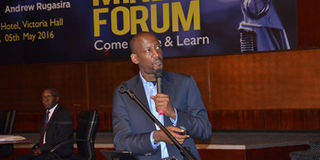State planners want conducive environment for informal sector

The chairman of Good African Coffee, Mr Andrew Rugasira, gives his presentation at the URA Open Minds Forum in Kampala last week. courtesy PHOTO
KAMPALA. The huge informal sector is a blessing in disguise that should be harnessed instead of being harassed, the country’s main planner has said.
According to the National Planning Authority (NPA) executive director, Mr Joseph Muvawala, the informal sector which makes nearly half of the country’s economy, is part and parcel of development.
As of June 2015, the informal sector was estimated to constitute 49 per cent of the country’s Gross Domestic Product (GDP), with agriculture, wholesale and retail trade, construction and the transport sectors being the most prevalent, according to 2015 data of the Ministry of Finance, Planning and Economic Development.
Speaking at the 9th Uganda Revenue Authority (URA) Open Minds Forum last week in Kampala, Mr Muvawala said informal sector is a transition to formal sector and for that it needs to be helped transit smoothly rather than disjointedly.
He said: “Dealing with informal sector should be a strategic choice by the government,” adding: “And the strategies involved should be based on incentives given by the government. If Informal sector is not courted into formalisation they will always beat the system.”
According to Mr Muvawala, instead of having informal players pay for power at domestic rates, they can be allowed to pay using industrial rates which is slightly cheaper.
In his presentation, the chairman of Good African Coffee, Mr Andrew Rugasira, described the informal sector as a journey from informal to formal way of doing business. The problem, he said, is how to tap the opportunity it presents rather than whining about the problem it poses.
To thrive from the opportunity informal sector presents, he suggested that the sector should be treated with respect and not contempt.
The role of strong association, reducing on bureaucracy and changing education system from academic to practical realities on the ground would be a step in the right direction. He argued that it makes no sense to produce so many lawyers at the expense of plumbers and builders.
He also differed with the popular view that informal sector is an invisible force, saying that is not true because, “we buy their rolex (chapatis rolled with eggs)” and we use their boda-bodas every day.”
The chairman of Kampala City Traders Association (Kacita), Mr Everest Kayondo, in his submission, said starting formally in business in Uganda’s situation is costly. That it is important to start at that level and along the way transition to formal way of doing business should take shape because in the long run it is more profitable to operate formally than informally.
All the presenters, including the URA commissioner general, Ms Doris Akol, agreed that it is important for everybody to pay some kind of tax so that others especially those in the formal sector are not burdened alone by the tax obligations.
It was also clearly evident that for the country to move forward without conditionalities of the donors, everybody must contribute to the national coffers.
And importantly perhaps, for the citizens to demand for their rights and government accountability, they should be the funders of government.
About the sector
According to the Uganda Bureau of Statistics deputy executive director, Ms Imelda Atai Musana, the informal sector, statistically is an economic unit which is household based. It contributed 47 per cent to GDP in 2014/15.




